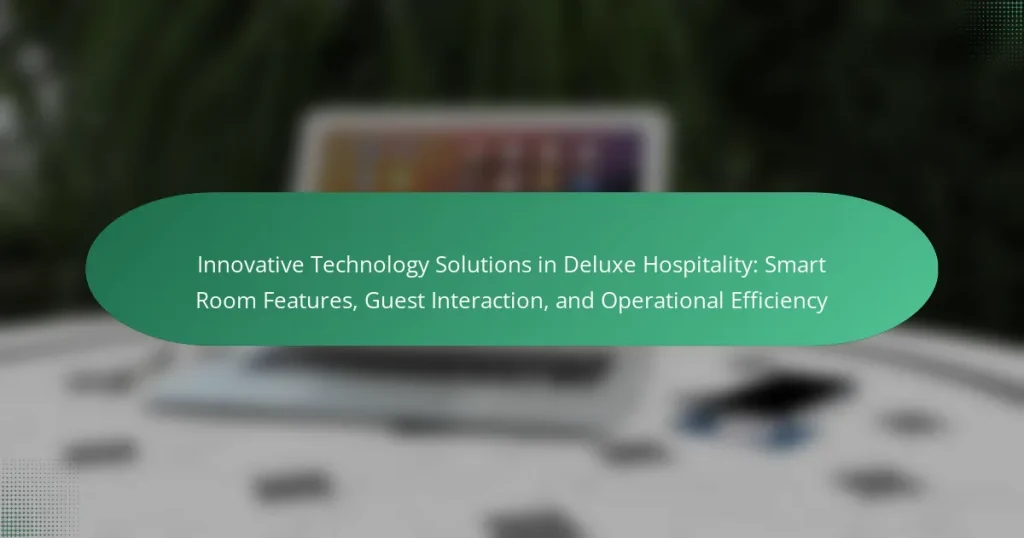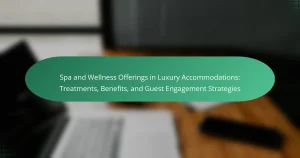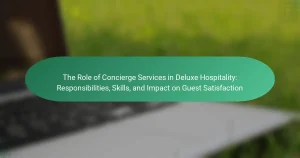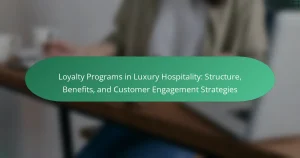Innovative technology solutions in deluxe hospitality significantly enhance guest experiences and operational efficiency. Key features include smart room technologies such as automated lighting and climate control, along with mobile applications that facilitate seamless guest interaction and service requests. Data analytics tools further personalize guest services and inform management decisions. A report from Hospitality Technology in 2023 indicates that hotels adopting these technologies experienced a 30% increase in guest satisfaction ratings, underscoring the positive impact of these advancements on the hospitality industry.
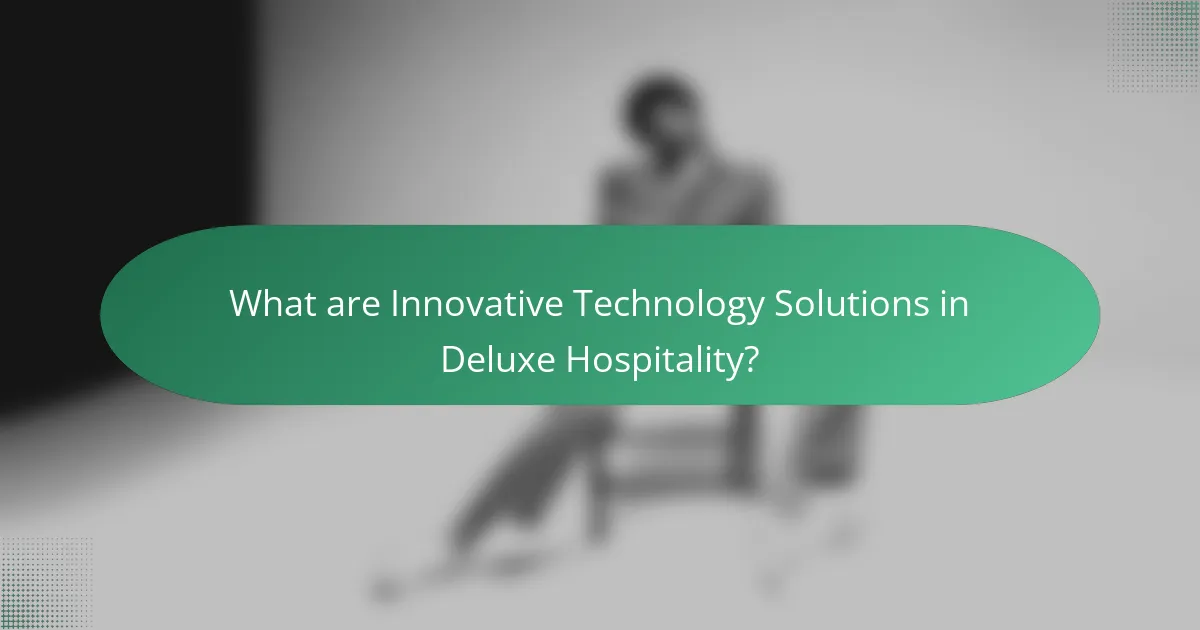
What are Innovative Technology Solutions in Deluxe Hospitality?
Innovative technology solutions in deluxe hospitality include advanced systems that enhance guest experiences and operational efficiency. These solutions feature smart room technologies, such as automated lighting and climate control. They also incorporate mobile applications for seamless guest interaction and service requests. Additionally, data analytics tools are used to personalize guest services and improve management decisions. According to a 2023 report by Hospitality Technology, hotels implementing these technologies saw a 30% increase in guest satisfaction ratings. This demonstrates the effectiveness of innovative solutions in elevating the hospitality experience.
How do Smart Room Features enhance the guest experience?
Smart room features enhance the guest experience by providing personalized and convenient services. These features include automated lighting, climate control, and entertainment systems. Guests can easily adjust settings through mobile apps or voice commands. This level of control leads to increased comfort during their stay. Smart rooms also offer seamless connectivity to personal devices. This allows guests to access their preferred content effortlessly. Additionally, smart technology can provide real-time information about hotel services and local attractions. According to a study by the American Hotel and Lodging Educational Institute, 70% of guests appreciate smart technology in hotels. This indicates a significant demand for such innovations in the hospitality industry.
What technologies are commonly integrated into Smart Rooms?
Smart rooms commonly integrate technologies such as IoT devices, smart lighting, and climate control systems. IoT devices enable seamless connectivity between appliances and the internet. Smart lighting allows guests to control brightness and ambiance through mobile apps or voice commands. Climate control systems adjust temperature based on guest preferences. Additionally, smart TVs provide access to streaming services and hotel information. Voice-activated assistants facilitate hands-free operation of room features. Security systems enhance guest safety with smart locks and surveillance. These technologies collectively improve guest experience and operational efficiency in deluxe hospitality settings.
How do Smart Room Features contribute to guest comfort and convenience?
Smart room features enhance guest comfort and convenience through automation and personalization. These features include smart lighting, climate control, and voice-activated assistants. Guests can adjust settings to their preferences easily. For example, smart thermostats learn individual temperature preferences for optimal comfort. Automated lighting can create the desired ambiance with a simple command. Voice-activated assistants enable guests to request services or information hands-free. Research shows that 75% of hotel guests prefer technology that simplifies their stay (Source: Hospitality Technology Report, 2022). Smart room features also reduce the need for physical interaction, promoting a seamless experience. Overall, these technologies provide tailored experiences that cater to guest needs and preferences.
What role does Guest Interaction play in modern hospitality?
Guest interaction is crucial in modern hospitality for enhancing guest experience and satisfaction. It fosters personal connections between staff and guests. Positive interactions can lead to higher guest loyalty and repeat visits. Engaging with guests through technology, such as mobile apps, allows for seamless communication. Personalized services based on guest preferences improve overall satisfaction. Studies show that 70% of guests value personalized interactions. Furthermore, effective guest interaction can lead to increased revenue through upselling opportunities. Modern hospitality relies on feedback from interactions to continually improve service offerings.
How can technology facilitate better communication with guests?
Technology can facilitate better communication with guests through various innovative solutions. Smart room features allow guests to control their environment via mobile apps or voice commands. This enhances comfort and convenience. Real-time messaging platforms enable direct communication between guests and staff. Guests can request services or report issues instantly. Automated check-in and check-out processes streamline guest interactions. This reduces wait times and improves satisfaction. Additionally, digital kiosks provide information and assistance without needing staff presence. Data analytics can personalize guest experiences based on preferences and past interactions. These advancements lead to improved guest satisfaction and operational efficiency.
What are the benefits of personalized guest interactions through technology?
Personalized guest interactions through technology enhance guest satisfaction and loyalty. Tailored experiences lead to improved customer engagement. Technology enables hotels to gather data on guest preferences. This data allows for customized recommendations and services. For example, guests can receive personalized welcome messages. They can also enjoy customized room settings based on their preferences. Studies show that personalized interactions can increase repeat bookings by up to 30%. Additionally, technology facilitates real-time feedback collection. This helps hotels to quickly address guest concerns and improve services. Overall, personalized interactions through technology create memorable experiences that drive business success.
How does Operational Efficiency improve with technology solutions?
Operational efficiency improves with technology solutions by automating processes and reducing manual tasks. Automation minimizes human error and speeds up operations. Technology solutions like property management systems streamline check-in and check-out processes. This leads to faster guest service and improved satisfaction. Data analytics optimize resource allocation and inventory management. For instance, hotels using smart energy management systems report up to 30% energy savings. Enhanced communication tools facilitate better coordination among staff. Overall, technology solutions lead to cost reductions and increased productivity in hospitality operations.
What operational challenges can technology address in deluxe hospitality?
Technology can address several operational challenges in deluxe hospitality. It enhances guest experience through personalization and efficiency. Smart room features allow for automated control of lighting, temperature, and entertainment systems. This reduces staff workload and increases guest satisfaction.
Additionally, technology streamlines communication between guests and staff. Mobile apps enable guests to request services or report issues instantly. This leads to quicker response times and improved service quality.
Data analytics helps hotels optimize resource allocation and inventory management. By analyzing occupancy trends, hotels can adjust staffing levels and manage supplies more effectively.
Furthermore, technology improves security measures. Keyless entry systems and surveillance cameras enhance guest safety and reduce theft. These innovations contribute to a seamless and secure hospitality experience.
How can technology streamline hotel management processes?
Technology can streamline hotel management processes by automating routine tasks. Automation reduces manual workload, allowing staff to focus on guest services. Property Management Systems (PMS) centralize operations like booking, billing, and room assignments. This integration enhances communication between departments, improving efficiency. Mobile apps enable guests to check-in, check-out, and request services seamlessly. Data analytics helps managers make informed decisions based on guest preferences and trends. According to a study by Cornell University, hotels using technology saw a 15% increase in operational efficiency. Thus, technology significantly enhances the overall management of hotel operations.
How do Smart Room Features integrate with other hospitality technologies?
Smart Room Features integrate with other hospitality technologies through seamless connectivity and data exchange. These features often utilize Internet of Things (IoT) devices to communicate with hotel management systems. For instance, smart thermostats adjust room temperatures based on guest preferences recorded in the property management system. Additionally, smart lighting systems can be controlled via mobile apps linked to the hotel’s network.
Voice-activated assistants in smart rooms can interface with guest service platforms, allowing guests to request services or information easily. Smart locks enhance security and can be synchronized with mobile check-in systems. This integration leads to improved operational efficiency and enhanced guest experiences. According to a study by Hospitality Technology, 70% of hotels reported increased guest satisfaction after implementing smart technologies.
What are the key trends in technology solutions for deluxe hospitality?
Key trends in technology solutions for deluxe hospitality include the integration of smart room features, enhanced guest interaction, and improved operational efficiency. Smart room technology allows guests to control lighting, temperature, and entertainment systems through mobile apps or voice commands. This personalization enhances guest experience and satisfaction. Enhanced guest interaction is facilitated by chatbots and mobile concierge services. These tools provide instant assistance and streamline communication between guests and staff. Operational efficiency is improved through the use of data analytics and IoT devices. These technologies enable hotels to monitor energy usage and optimize resource management. According to a report by Hospitality Technology, 70% of hotels are investing in technology to enhance guest experience. This demonstrates the industry’s commitment to leveraging technology for superior service.
What specific benefits do guests experience from Innovative Technology Solutions?
Guests experience enhanced comfort and convenience from Innovative Technology Solutions. Smart room features allow guests to control lighting, temperature, and entertainment systems easily. This personalization leads to improved satisfaction during their stay. Additionally, mobile apps facilitate seamless check-in and check-out processes. Guests can access hotel services and amenities directly from their devices. Real-time communication with staff enhances service efficiency and responsiveness. Data analytics from these technologies help hotels tailor experiences based on guest preferences. Overall, these solutions contribute to a more enjoyable and memorable stay for guests.
How do these solutions enhance overall guest satisfaction?
Innovative technology solutions enhance overall guest satisfaction by providing personalized experiences and streamlined services. Smart room features allow guests to control lighting, temperature, and entertainment systems, catering to individual preferences. This level of customization leads to increased comfort and enjoyment during their stay.
Additionally, enhanced guest interaction through mobile apps enables quick communication with hotel staff. Guests can request services or report issues instantly, improving response times and service efficiency. Research shows that hotels utilizing these technologies see a 20% increase in guest satisfaction ratings.
Operational efficiency is another crucial aspect. Automated systems reduce wait times for check-in and check-out processes. This efficiency minimizes frustrations and creates a smoother overall experience for guests. Together, these solutions create a more enjoyable and memorable stay, leading to higher satisfaction levels.
What feedback do guests provide regarding technology in hospitality?
Guests often provide positive feedback regarding technology in hospitality. They appreciate the convenience of mobile check-in and check-out options. Many guests highlight the benefits of smart room features, such as automated lighting and temperature control. Guests frequently mention the ease of accessing entertainment systems and high-speed Wi-Fi. Some guests express satisfaction with digital concierge services for quick information access. However, there are complaints about technical issues, such as unreliable Wi-Fi connections. Guests also desire more user-friendly interfaces for in-room technology. Overall, feedback indicates that while guests value technological advancements, reliability and ease of use are crucial for satisfaction.
What best practices should hotels follow when implementing technology solutions?
Hotels should follow a structured approach when implementing technology solutions. First, they should assess their specific needs and goals. This ensures that the chosen technology aligns with operational objectives. Next, hotels should involve key stakeholders in the decision-making process. Engaging staff and management helps identify practical requirements and potential challenges.
Additionally, hotels should prioritize user-friendly technology. Solutions that are easy to use enhance guest satisfaction and staff efficiency. Training programs for staff are essential to maximize the benefits of new technologies. Proper training ensures that employees can effectively utilize the systems.
Furthermore, hotels should consider integration capabilities. Technology solutions should seamlessly integrate with existing systems for streamlined operations. Regular evaluation and feedback are crucial after implementation. Gathering insights from staff and guests helps refine technology use.
Finally, hotels should stay updated on industry trends. This allows them to adapt and incorporate innovative solutions as they emerge. Implementing these best practices can lead to improved guest experiences and operational efficiency.
Innovative technology solutions in deluxe hospitality focus on enhancing guest experiences and operational efficiency through smart room features, improved guest interaction, and streamlined management processes. Key technologies include IoT devices, automated lighting and climate control, mobile applications for seamless communication, and data analytics for personalized services. These advancements lead to increased guest satisfaction, with studies showing significant improvements in comfort and convenience. Additionally, operational efficiencies are realized through automation and better resource management, addressing common challenges faced by the hospitality industry.
